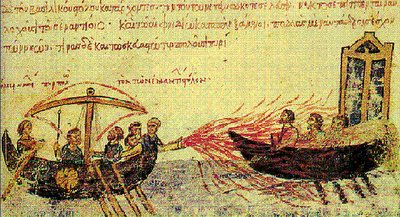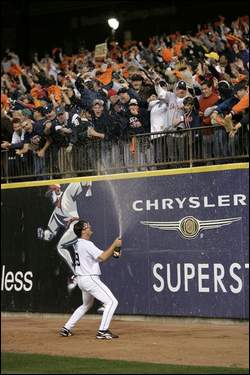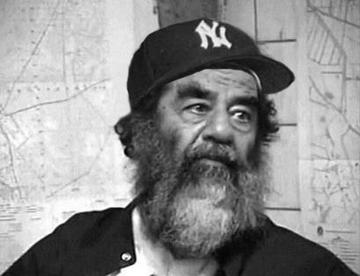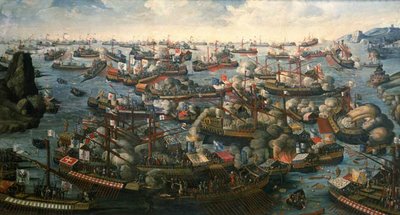Weekend at Bashir's.James Carroll, novelist and op-ed columnist at the Boston Globe is the examplar of a common type of Catholic who emerged in the turbulence following the Second Vatican Council. Believing that the millenium was upon them, they cast aside every Catholic distinctive with a speed that a Deja Vu pole dancer would consider unseemly.
However, since the millenium failed to arrive on schedule, and as the
Anni Horribli of John Paul II and now Benedict XVI stretched into decades, they resemble nothing so much
as a support group for the perpetually embittered and carping, lifting their heads from bowls of chaff only long enough to repeat the same gripy canards, over and over and over and over again. Unfortunately for the rest of us, this is good enough for the only audience that still pays attention (and salaries) to them--the opinion shapers in the MSM.
Carroll is in the running for the title of
Most Tiresome of these skipping records. Given his fangs-bared hatred for the Church, he's best described as the Noam Chomsky of Catholicism.
As a consistently Catholic-hating Catholic, Carroll hasn't offered up a thought about the Church that hadn't already been pre-chewed by the leftism to which he owes his unquestioning allegiance. But you have to admit, it's a helluva gig, and it plays to a certain audience just like Mozart.
The sad fact is that Carroll, while a novelist of some ability, is an embarrassing failure as a historian and pundit about his nominal religious affiliation.
His recent Pollock-by-numbers column about the Regensburg address offers damning evidence.
ROME HAS SPOKEN. Once, that meant the question was settled. Now that means the question has been inflamed. In this case, the question is whether to accept Osama bin Laden's invitation to the clash of civilizations. Sure, why not?Of course, he has a clash whether he wants it or not. His response is to pretend that his tired blend of multi-culti tolerance (read: contempt for the West) and shrill denial isn't unconditional surrender. Ask the French how that's working out for them. Feel free to wait a generation--there should be a lot more of them over here to ask by then...
Pope Benedict XVI celebrated the fifth anniversary of 9/11 by citing, on the next day, a 14th-century slur that Mohammed brought ``things only evil and inhuman, such as his command to spread by the sword the faith he preached."
Behold--the novelist at work! Because that misquote creates a neat alternate history of Carroll's own imagining. Here's the entire relevant quote of the brilliant Manuel II, along with the essential context provided by the Holy Father (and omitted by the carping Catholic Chomsky):
In the seventh conversation, edited by Professor Khoury, the emperor touches on the theme of the holy war. The emperor must have known that surah 2, 256 reads: "There is no compulsion in religion". According to the experts, this is one of the suras of the early period, when Mohammed was still powerless and under threat. But naturally the emperor also knew the instructions, developed later and recorded in the Qur'an, concerning holy war. Without descending to details, such as the difference in treatment accorded to those who have the "Book" and the "infidels", he addresses his interlocutor with a startling brusqueness, a brusqueness which leaves us astounded, on the central question about the relationship between religion and violence in general, saying: "Show me just what Mohammed brought that was new, and there you will find things only evil and inhuman, such as his command to spread by the sword the faith he preached". The emperor, after having expressed himself so forcefully, goes on to explain in detail the reasons why spreading the faith through violence is something unreasonable. Violence is incompatible with the nature of God and the nature of the soul. "God", he says, "is not pleased by blood - and not acting reasonably is contrary to God's nature. Faith is born of the soul, not the body. Whoever would lead someone to faith needs the ability to speak well and to reason properly, without violence and threats... To convince a reasonable soul, one does not need a strong arm, or weapons of any kind, or any other means of threatening a person with death...".
IOW, the Emperor condemned only that which new in--i.e., original to-- Islam, not Muhammad's thought in toto.
As the the Pope made clear, he disagreed with that statement. I agree with him on that, too. There are, in fact, "new" things from Muhammad that are laudable--the explicit condemnation of female infanticide, for starters.
But Carroll twists the quote into a blanket condemnation. Holding true to form, he dishonestly loads the dice against his erstwhile co-religionists, making it an effective smear for his audience, most of whom are too narrow-minded to bother to pick up the actual address. The fix is in, which was probably the idea. Given his inclinations and history, it is silly to give Carroll the benefit of the doubt.
The patently false characterization of Mohammed's teaching, displaying an ignorance of the Koran, of the magnificence of Islamic devotion, and of history was offered almost as an aside in the pope's otherwise esoteric lecture about reason and faith. After Muslim uproar, the pope, while not really apologizing, insisted he had meant no harm.
From the context of this hit piece, "esoteric" = "dismiss after speed-reading." When you're a Card-Carrying critic of the "institutional church," you can automatically dispense with technicalities like contextual reading. It's from the big, bad Beast by the Tiber--he's read it all before. It's his job to filter it out to the Globe audience via the Gospel According to NPR.
In fact, if you think of Carroll as a Unitarian Gantry, you have him nailed.
As to the rest--Oh dear. The novelist properly rebuked for his amateur-night history of the Catholic Church's relationship to Judaism now styles himself as an expert on Islam.
The woodshed is ready and waiting.
And, for the record, please do show us precisely what is false about it, O Columnist? Sura 9:5 seems...free of nuance. Any possible flaws in Islam? No? Good dhimmi! Your jizya will be extracted with minimal head-swatting.
So long as it's paid on time, of course.
President Bush famously used the word ``crusade," then backed away from it. But playing by bin Laden's script, Bush launched a catastrophic war that has become a crusade in all but name.
Bush Derangement Syndrome in full-flower. If Carroll was assigned to write a column on continental drift, he'd manage to work in a reference to Chimpy W. McHitlerburton.
Now Benedict has supplied a religious underpinning for that crusade.
You mean the same fellow who unequivocally condemned the plans to attack Iraq?
Oooooookay.
[The Card also excuses carriers from any need to display intellectual rigor or consistency. Membership has its benefits.]
Claiming to defend rationality and nonviolence in religion, the pope has made irrationality and violence more likely, not less. Bush and Benedict are in sync, and bin Laden is grinning.
"Grinning," eh? Most likely. Flesh-free skulls do that. Score one for the fictionist, I suppose.
But just how did the Pope make irrationality and violence more likely?
Even abstracting from the offending citation, the pope's lecture reveals a deeper and insulting problem. Benedict properly affirms the rationality of faith, and the corollary that faith should be spread by reasoned argument and not by violent coercion. But he does so as a way of positing Christian superiority to other faiths.
And Carroll, as a good Unitarian in Catholic drag, simply will not have that. Carroll is convinced that if Jesus were still alive today, he'd sound an awful lot like, well, Jim Carroll.
That was the point of the passing comparison with Islam -- which, supposedly, is irrational and therefore intrinsically violent, unlike Christianity which is rational and intrinsically eschews coercion.
But this ignores history: Christianity, beginning with Constantine and continuing through the Crusades up until the Enlightenment, routinely ``spread by the sword the faith" it preached; Islam sponsored rare religious amity among Jews, Christians, and Muslims in the very period from which the insulting quote comes.
Hilarious. Grimly so, but still hilarious. The one doing the ignoring of history is our white-washing columnist. He is painfully, stupidly, gothically wrong about an alleged Kumbaya moment in fifteenth century Islam. When Manuel II wrote, the tattered remnants of Byzantium were struggling against the surging Ottoman tide, a tide that would swamp Christendom's queen city of Constantinople in 1453 and butcher Manuel's heroic son Constantine in the process.
One of the handiest tools in the Ottoman kit was the Janissary, a fierce and devoted Muslim soldier loyal only to the Turkish sultan. The Janissaries would be the first soldiers to break through the Byzantine defenses on that bleak morning of May 29, 1453, and they would ensure the fall of the City of Constantine.
Where did the Janissaries come from? I'll solve, Pat: "Devshirme." Turkish for "gathering," it was the process by which Christian families under Ottoman rule had their sons taken from them. With Koranic justification, of course: Sura 8, verse 41. To be fair, the verse refers only to a taking of goods, but sadly, the Sultan Orhan, who initiated the practice, didn't have Carroll there to set him straight.
The practice of devshirme saw Ottoman troops march into Christian villages and remove the best and brightest of the sons from their families under penalty of death. Those sons were cut off from their families and raised in isolated schools that inculcated Islam, loyalty to the Sultan and trained them in the arts of war. Said warfare being directed at the Sultan's enemies, of course. First and foremost, the beleaguered Christians of Byzantium and the Balkans. That's some "sponsorship of amity" all right.
Carroll is a fierce critic (and rightfully so) of the taking of the six year old Jewish boy Edgardo Mortara from his family by papal troops in 1858. The devshirme was Edgardo Mortara times 200,000, across three centuries. Not that he cares, of course. The willfully ignorant will not be denied.
Yeah--I don't know about you, but I can just feel the tolerance Manuel II was so impudent to criticize.
[Those of you looking for some cheer can consider the fact that devshirme had one immortal case of blowback in the form of the Albanian hero George Castriota, better known to history as Skanderbeg. With apologies to the Scots, Skanderbeg's exploits make Wallace look very much junior varsity.]
But let's pretend for a moment that medieval Islam was All Andalusian Cordoba, All the Time. There's only one tiny little flaw all those tolerant, oh-so-multicultural I'm OK, You're OK Muslims share:
They're all very, very dead.
Waving them as totems is Weekend at Bernie's for the Boston set--hence, Weekend at Bashir's.
Spin that tale of supposed medieval tolerance to Abdul Rahman, Lina Joy, Steve Centanni and Olaf Wiig, all of whom have seen the business end of the "no compulsion in religion" religion.
Those episodes have happened in the last two years. Unlike, say, the Crusades.
The descendants of the Muslim medievals seem remarkably resistant to their sires' alleged ideals. You'd think it would behoove Carroll to wonder why.
You'd think, but you'd be wrong. He's too busy doing his Sinead O'Connor impersonation and "fighting the real enemy."
More significant, though, for any discussion of reason and faith is the fact that Christian theology's breakthrough embrace of the rational method, typified by St. Thomas Aquinas's appropriation of Aristotle, and summarized by Benedict as ``this inner rapprochement between Biblical faith and Greek philosophical inquiry," was made possible by such Islamic scholars as Averroes, whose translations of Aristotle rescued that precious tradition for the Latin West.
Alas for Islam that Averroes--and Avicenna--were condemned as heretics, and that Islam, unlike Catholicism, was unable to assimilate Aristotelian thought.
Inconvenient facts--always screwing up a good whitewashing.
Benedict makes no mention of this Islamic provenance of European and Christian culture.
See above. At most, they were caretakers, not "providers."
Indeed, he cannot, because his main purpose in this lecture is to emphasize the exclusively Christian character of that culture. The ``convergence" of Greek philosophy and Biblical faith, ``with the subsequent addition of the Roman heritage, created Europe and remains the foundation of what can be rightly called Europe." Europe remains Christian. That is why the pope, as Cardinal Ratzinger, opposed the admission of Muslim Turkey to the European Union.
Benedict seems to have forgotten that the European rejection of violent coercion in religion came about not through religion but through the secular impulses of the Enlightenment.
Did it, now? Well, you can certainly find evidence of tolerance in Christianity, too--I Nicaea's call to leave Jews alone, Emperor Leo III building a mosque in Constantinople in the 720s, the Navarese nobles refusing to let the Inquisition near their Muslim peasants, the accommodations following the wars between Catholics and Protestants. To name but a few. Arguing that it sprang from the Enlightenment like Athena from the brow of Zeus seems...simplistic. Then again, consider the source.
The separation of church and state, in defense of the primacy of individual conscience, was the sine qua non of that rejection of religious coercion -- an idea that the Catholic Church fought into the 20th century. Even now, Benedict campaigns against basic tenets of Enlightenment politics, condemning pluralism, for example, and what he calls the ``dictatorship of relativism."
Again, entirely too simplistic, or otherwise good Catholic men like John Courtney Murray and the Fathers of the Second Vatican Council wouldn't have had a leg to stand on in their decrees on the subject of religious freedom.
But of course Carroll hates the "dictatorship of relativism" line--he has no rebuttal. The Enlightenment was hardly some unalloyed good--the same process also brought us the guillotine, the exaltation of the state and the guillotine's muscular grandchildren, Zyklon B and the Gulag. In light of this, Benedict might just have grounds for a wee bit of skepticism toward Carroll's idol.
The pope's refusal to reckon with historical facts that contradict Catholic moral primacy has been particularly disturbing in relation to the church's past with Jews.
Ah, the other Carroll hobbyhorse--the Church's relationship to Judaism. Jews of the past, that is. Please note that his solicitude for Jews ends in 1948, with the founding of Israel. Judaism is just a stick to beat the Church with, and his concern for Jews is quickly discarded where it conflicts with his leftist precommitments.
Last year, he said Nazi anti-Semitism was ``born of neo-paganism," as if Christian anti-Judaism was not central.
It's much more accurate to say Christian anti-semitism was necessary to the Holocaust, but hardly sufficient. Christian pogroms and expulsions of Jews stain our history, but the genocidal intent of the Nazis was something horribly new. Don't let that get in the way of a good slur, though.
This year, at Auschwitz, he blamed the Holocaust on a ``ring of criminals," exonerating the German nation. By exterminating Jews, the Nazis were ``ultimately" attacking the church.
Non-hacks would note that his very presence at Auschwitz belies any blanket exoneration. As to the rest, I call "fraud." Here's the relevant quote:
The rulers of the Third Reich wanted to crush the entire Jewish people, to cancel it from the register of the peoples of the earth. Thus the words of the Psalm: "We are being killed, accounted as sheep for the slaughter" were fulfilled in a terrifying way.
Deep down, those vicious criminals, by wiping out this people, wanted to kill the God who called Abraham, who spoke on Sinai and laid down principles to serve as a guide for mankind, principles that are eternally valid. If this people, by its very existence, was a witness to the God who spoke to humanity and took us to himself, then that God finally had to die and power had to belong to man alone -- to those men, who thought that by force they had made themselves masters of the world.
By destroying Israel, they ultimately wanted to tear up the taproot of the Christian faith and to replace it with a faith of their own invention: faith in the rule of man, the rule of the powerful.
Nope. Not what Carroll wants it to say. But why let that stop him?
He decried God's silence, not his predecessor's.
Maybe because Pius XII wasn't "silent"? A good argument can be made that he could have done more, but the silence argument is a worn canard.
A pattern begins to show itself.
In Carroll's writing, absolutely. Metronomic, even.
Forget church offenses against Jews. Denigrate Islam. Caricature modernity and dismiss it.
It is true that forgetfulness, denigration and caricature are all on display here, but only in a deeply ironic way.
In all of this, Benedict is defending a hierarchy of truth. Faith is superior to reason. Christian faith is superior to other faiths (especially Islam). Roman Catholicism is superior to other Christian faiths. And the pope is supreme among Catholics. He does not mean to insult when he defends this schema, yet seems ignorant of how inevitably insulting it is. Nor does the pope understand that, today, such narcissism of power comes attached to a fuse.
If someone wants to unpack the crowning paragraph of Carroll's shell-shocked bile, knock yourself out. But we should take heed on the "narcissism" line--he certainly knows of what he speaks.
[Thanks to Jay for the link.]
[Update: Tweaked 10/27--filled a couple of potholes that were bugging me.]




















